Washington State DEI Empowerment Conference 2024
Welcome! The annual DEI Empowerment Conference is designed by and for Washington state employees. Admission is free and open to all employees of Washington state agencies, boards, and commissions.
Register NOW!
We are excited to announce the speakers for the 2024 conference schedule. In the schedule section below, you will see a list of presentations. Click the specific date tab to see the presentation description and the speaker bios. Registration is open now!
Some Sessions Availale Only As Live Stream Events
Most conference sessions will be recorded and available for replay. A few will not be recorded for various reasons including to foster speaker safety, honor traditions and cultural norms, and respect topics undergoing rapid change at the time of presentation. Check the "Ways to Watch" information in the presentation description to see if the session you are interested in must be watched during the live stream or will be available for replay.
June 2024 Schedule
Select a tab below to see available sessions for each day. Register here starting May 1!
The 2024 WA DEI Empowerment Conference theme is Equity & Belonging Through Disrupting Policy & Practice. When we say “Disrupting,” we are focusing on the importance of pausing and analyzing current policies and practices to help us identify and remove barriers. We are committed to supporting statewide and agency-specific efforts to build a broad path toward equity, anti-racism and belonging in the workplace. All employees have the power to contribute.
| Session Title | Date | Presenter(s) | Registration/Password |
|---|---|---|---|
| Be a Revolution! - Welcome Keynote with Ijeoma Oluo | Jun 5, 2024 - 8:30am | Ijeoma Oluo (she/her) | |
| Ownership > Buy In: Creating a Curious Culture | Jun 5, 2024 - 10:30am | Pat McGregor (he/him) & Amandeep Puri (she/her) | |
| Equity and Belonging – Why am I so emotional? | Jun 5, 2024 - 1:00pm | Aunna Moss (she/her) & Lenora Sneva (she/her) | |
| Building DEIB Momentum Amid the War Against DEI | Jun 5, 2024 - 3:00pm | Marianne Ozmun-Wells (she/they) | |
| Combatting Islamophobia and Antisemitism | Jun 6, 2024 - 8:30am | Maha Elgenaidi and Karen Stiller | |
| The ADA: A Model for Disrupting Policies and Practices to Foster Equity | Jun 6, 2024 - 10:30am | NW ADA Center | |
| The Myth of the Model Minority | Jun 6, 2024 - 1:00pm | Jim Mendoza (he/him) | |
| Immigration as a Barrier to Employment- Raising Every Voice | Jun 6, 2024 - 3:00pm | Teddy Dianah Kemirembe (she/her), Sarah MacLeod (she/her) & Seth Pilkey (he/him) | |
| Disrupting Organizational Status Quo By Identifying Equity Gaps in Policy and Practice Across the Organization | Jun 11, 2024 - 8:30am | Dr. William Lewis (he/him) | |
| Enhancing Veteran Inclusivity in Washington State Workforce: Disrupting current policies for greater equity and belonging | Jun 11, 2024 - 10:30am | VERG Members | |
| Disability Inclusion: simple steps you can take today to make your workspaces more inclusive and equitable | Jun 11, 2024 - 1:00pm | Linda Lohdefinck (she/her) & Sarah Norton (she/her) | |
| Embedding The 4-D Model of Neuro-Inclusive Communication | Jun 11, 2024 - 3:00pm | Chris Hooten, M.A. (they/them) | |
| Supporting Leadership and Utilizing BRGs to Recruit and Retain Latine Employees | Jun 12, 2024 - 8:30am | Hermina Esqueda (she/her/ella), Tony Griego (he/him) & Monica Andrade Hupp (she/her) | |
| Building an Organizational Road Map for Equity & Belonging | Jun 12, 2024 - 10:30am | LueRachelle Brim-Atkins (she/her) | |
| Living in Two Worlds-Unpacking Institutional and Policy Inequities Through Story | Jun 12, 2024 - 1:00pm | Elizabeth Coleman (she/her), Tammy Cooper-Woodrich (she/her), Angela Letoi (she/her), and Melody Woodrich (she/her) | |
| Normalizing Shared Power as a tool to Disrupt Policies, Practices, and Processes (The 3 P's) | Jun 12, 2024 - 3:00pm | Rauniesha Larkins (she/her/diva), Sabrina Njoroge (she/her), Amber Ortiz-Díaz (she/her/ella) & Jean Paul (he/him) |
8:30 AM–10 AM Session
Be a Revolution! - Welcome Keynote with Ijeoma Oluo
Presenter(s):
Ijeoma Oluo (she/her)
Author & Speaker
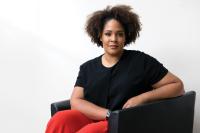
Presenter(s):
Ijeoma Oluo (she/her)
Author & Speaker

Session Description:
Keynote and Q&A with Washington's own New York Times Best Selling author, Ijeoma Oluo. Oluo will share insights from her DEI work and her celebrated books, "So You Want to Talk About Race," "Mediocre: the Dangerous Legacy of White Male Power," and "Be A Revolution: How Everyday People Are Fighting Oppression and Changing the World—and How You Can, Too."
This session is brought to you in partnership with funding from WSECU, and support from the Interagency Committee of State Employed Women (ICSEW) and the statewide Business Resource Group (BRG) book club.
Objectives and Key Takeaways:
- How to have conversations about race.
- Ways that people are creating revolutions.
Audience:
Learn about the presenter(s):
Ijeoma Oluo (ee-joh-mah oh-loo-oh) is a Seattle-based Writer, Speaker and Internet Yeller.
Her work on social issues such as race and gender has been published in The Guardian, Esquire, Washington Post, ELLE Magazine, New York Times, NBC News and more. She has been featured on The Daily Show, All Things Considered, BBC News, and more. Her #1 NYT bestselling first book, So You Want To Talk About Race, was released January 2018 with Seal Press. Her Second book, MEDIOCRE: The Dangerous Legacy of White Male America, was published December 2020 with Seal Press and her upcoming book, Be A Revolution: How Everyday People Are Fighting Oppression and Changing the World - and How You Can Too, will be released January 2024 with Harper One.
Ijeoma was named one of the Most Influential People in Seattle by Seattle Magazine, one of the 50 Most Influential Women in Seattle by Seattle Met, one of The Root's 100 Most Influential African Americans in 2017 & 2018, and is the recipient of the Feminist Humanist Award 2018 by the American Humanist Association, the Harvard Humanist of the year 2020, the Media Justice Award by the Gender Justice League, and the 2018 Aubrey Davis Visionary Leadership Award by the Equal Opportunity Institute.
Ways to watch:
Live stream on June 5, 2024
Recording available for replay July 1 through August 31
10:30 AM–12 PM Session
Ownership > Buy In: Creating a Curious Culture
Presenter(s):
Pat McGregor (he/him) & Amandeep Puri (she/her)
Washington State Patrol
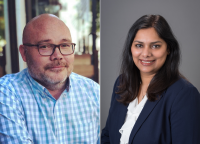
Presenter(s):
Pat McGregor (he/him) & Amandeep Puri (she/her)
Washington State Patrol

Session Description:
This presentation seeks to address the critical aspects of organizational development, focusing on bridging learning gaps, establishing effective norms, structuring inclusive conversations, creating engaging activities, and fostering community engagement within an agency. Participants will gain practical insights and strategies to enhance learning experiences, promote collaboration, and build a positive organizational culture.
Objectives and Key Takeaways:
- The Importance of Norms:
Explore the significance of norms in fostering a conducive learning environment.
Learn how to establish and leverage norms for enhanced collaboration and productivity.
- Structuring Conversations:
Techniques to structure conversations that accommodate a wide variety of beliefs and values.
Creating inclusive dialogue frameworks for diverse learning styles.
- Building Engaging Activities:
Develop activities that actively engage participants in the learning process.
Strategies to cater to different learning preferences and ensure active participation.
- Community Engagement:
Understand the role of community engagement in organizational development.
Practical steps to integrate community-building initiatives into your agency.
Audience:
Audience Knowledge and Experience:
Learn about the presenter(s):
Pat has worked for the Washington State Patrol since 2022 in their Culture and Engagement Office. Before coming to WSP, Pat spent 23 years in education, as a 5th/6th grade teacher, instructional coach, and elementary school principal. He lives in Tacoma with his wife Candice and is active in his community. They have a son, Cameron, who also lives in Tacoma.
Amandeep Puri has worked for the Washington State Patrol for the last four years in the Office of Culture and Engagement. Prior to coming to WSP, she worked as a professor for Tacoma Community College. Amandeep lives in Federal Way with her husband, Sameer, and their two sons.
Ways to watch:
Live stream on June 5, 2024
Recording available for replay July 1 through August 31
1 PM-2:30 PM Session
Equity and Belonging – Why am I so emotional?
Presenter(s):
Aunna Moss (she/her) & Lenora Sneva (she/her)
Office of Financial Management (OFM)
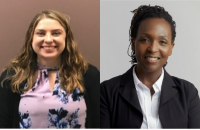
Presenter(s):
Aunna Moss (she/her) & Lenora Sneva (she/her)
Office of Financial Management (OFM)

Session Description:
Aunna and Lenora will navigate you through the emotional aspects of change in equity and belonging work. This session will help you identify feelings and acknowledge loss using practical organization change management frameworks including the Kubler Ross Change Curve and the William Bridges Transition Model.
The Office of Financial Management (OFM) is using organization change management frameworks to help embed diversity, equity, inclusion and belonging into agency culture. We will share how OFM developed and implemented an equity and belonging forum also known as “the Forum.”
Objectives and Key Takeaways:
- Understand the normal and natural emotional responses to change.
- Understand why it is important to apply organization change management frameworks to help embed diversity, equity, inclusion and belonging into agency culture.
- Learn how to apply scalable organization change management frameworks to equity and belonging work.
- Learn about a real-world example of how OFM is embedding equity and belonging into agency culture.
Audience:
Audience Knowledge and Experience:
Learn about the presenter(s):
Aunna Moss is an Organization Strategy and Performance Lead Consultant for the Washington State Office of Financial Management. In this role, she partners with leaders and employees to support division strategic planning, project management, process improvement, and organizational change management efforts. Aunna also supports agency-wide initiatives including strategic planning and OFM’s Pro-Equity Anti-Racism (PEAR) Plan.
Aunna has worked for the State of Washington since 2013 and holds a bachelor’s degree in business administration from Saint Martin’s University. She is also certified in Lean Six Sigma and Prosci Change Management.
Lenora Sneva leads Office of Financial Management's organization strategy and performance team, collaborates and empowers leaders and staff in pro-equity anti-racism, strategic planning, organization change management and continuous improvement. She has worked for the state of Washington since 2010 and holds a master's degree in public administration and bachelor's in communication from the University of Washington. Her free time is consumed with family, shuffling her teen daughters to competitive volleyball tournaments, exercising and starting a podcast. She has certificates for Diversity Executive (CDE), Prosci Change Management, Lean, DDI Leadership Development, 7 Habits for Highly Effective People, and DISC Behavioral Style. Favorite morning drink: chai tea latte with oat milk
Favorite thing to do: stay grateful
Ways to watch:
Live stream on June 5, 2024
Recording available for replay July 1 through August 31
3 PM–4:30 PM Session
Building DEIB Momentum Amid the War Against DEI
Presenter(s):
Marianne Ozmun-Wells (she/they)
Department of Licensing (DOL)
Presenter(s):
Marianne Ozmun-Wells (she/they)
Department of Licensing (DOL)
Session Description:
After George Floyd's 2020 murder, public and private agencies invested in DEIB personnel and programs. Dual pandemics, one - a virus, the other - vitriol, created wider societal divisions. The progress toward open dialogue about prejudice in the USA gave way to "reverse discrimination" claims and legislative bans against historical truth-telling, bodily autonomy, and critical thinking. Simultaneously, hate crimes against Asian Americans rose significantly. Hate-driven violence also increased against LGBTQIA+ people, Jewish Americans, and Muslim Americans. Public, private, and academic institutions saw their DEIB programs face layoffs, program cuts, and slashed budgets. Some have taken an "eyes down, don't-focus-on-the-problem" approach to this trend. In a Pro-Equity, Anti-Racist state, we are obligated to acknowledge and speak truth and mobilize against common threats to equity. This session will look at narrative and statistical evidence of “anti-DEIB” efforts combined with data about hate-motivated actions. Through media and case studies, we will explore how anti-DEIB efforts have succeeded, while simultaneously exploring “bright spots,” DEIB models that have shown sustainability and success. We will discuss best practice tools for building DEIB momentum; and share self and community care approaches in this emotionally taxing work.
Objectives and Key Takeaways:
- Anti-DEIB efforts are increasing, gaining traction, and becoming institutionalized through both legislation and public opinion.
- Hate motivated attacked on people from historically and currently marginalized groups, continue to increase.
- We must recognize that Washington may not be immune to this trend. We are challenged to be proactive and strategic, advance and imbed DEIB principles and practices, and take care of ourselves and one another.
- There are programs that have survived and thrived amid the opposition. What can we learn from them.
- We are the best experts on what constitutes self care and community care as we continue to engage in emotionally laborious work.
Audience:
Audience Knowledge and Experience:
Learn about the presenter(s):
Marianne K. Ozmun-Wells is the Equity and Inclusion Administrator for the Washington State Department of Licensing. She has worked for Washington state for 22 years in DEI and Communications roles. Marianne is a lifelong learner who continually aspires to be a better anti-racism activator, cultural connector, and historical truth-teller. She lives in Olympia with her wife of 30 years. The new empty-nesters frequent the Palouse region to visit their 19-year-old daughter, a wildlife ecology major, at WSU. Go Cougs!
Ways to watch:
Live stream on June 5, 2024
Recording available for replay July 1 through August 31
8:30 AM–10 AM Session
Combatting Islamophobia and Antisemitism
Presenter(s):
Maha Elgenaidi and Karen Stiller
Islamic Networks Group (ING) Interfaith Speaker's Bureau
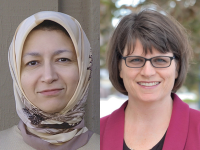
Presenter(s):
Maha Elgenaidi and Karen Stiller
Islamic Networks Group (ING) Interfaith Speaker's Bureau

Session Description:
Since the escalation of violence in Gaza and Israel in October 2023, both Islamophobic and antisemitic incidents have surged in the U.S. A panel featuring a Muslim speaker and a Jewish speaker aims to shed light on these forms of bigotry. They will define the roots and tropes of Islamophobia and antisemitism and examine how they’ve impacted ordinary Americans from diverse backgrounds—Muslim, Arab, Palestinian, Jewish, and Israeli. The panel concludes by offering recommendations to combat these prejudices at both interpersonal and institutional levels. Throughout the event the speakers will entertain questions and have a discussion with the audience.
Objectives and Key Takeaways:
- An understanding of the roots, definition, and tropes of Islamophobia and antisemitism
- An understanding of the impact of Islamophobia and antisemitism on Americans from diverse backgrounds
- Strategies for combatting both forms of prejudices at both the interpersonal and institutional levels.
Audience:
Audience Knowledge and Experience:
Learn about the presenter(s):
Maha is the founder of ING and currently its Executive Director, overseeing the organization. She is the author of training handbooks on outreach for American Muslims as well as training seminars for public institutions on developing cultural competency with the American Muslim community. She received an M.A. in religious studies from Stanford University and B.A in political science and economics from the American University in Cairo. She has taught classes on Islam in the modern world in universities such as Santa Clara University and the University of California at Santa Cruz, and has been recognized with numerous awards, including the “Civil Rights Leadership Award” from the California Association of Human Relations Organizations, the “Citizen of the Year Award” from the Santa Clara County Board of Supervisors, and the “Dorothy Irene Height Community Award” from the NAACP-Silicon Valley. She’s currently an advisor for the CA Commission on Police Officers Standards and Training (POST), a member of the Council of Advisors for the Freedom Forum that helps shape American views on the First Amendment; and Commissioner on the County of Santa Clara’s Hate Crimes Task Force.
Karen has an MSSA with a Certificate in Nonprofit Management from Case Western Reserve University. Originally from Buffalo, New York, Karen started her professional career in social work and nonprofit management. She moved to the Bay Area in 2000, where she worked in the Preventive Defense Project at Stanford University. Karen has been with the Jewish Community Relations Council since 2002, first as Peninsula Director and currently as Senior Director of Jewish Affairs. She has been deeply involved in interfaith work over the years, including helping start up two local interfaith councils. She was recently appointed as a Human Relations Commissioner for the City of Fremont. Karen is also a Jewish speaker on ING's Interfaith Speakers Bureau.
Ways to watch:
Only available as a live stram via Zoom on June 6.
10:30 AM–12 PM Session
The ADA: A Model for Disrupting Policies and Practices to Foster Equity
Presenter(s):
NW ADA Center

Presenter(s):
NW ADA Center

Session Description:
In this session, you will learn about "reasonable modifications" and "reasonable accommodations" as defined in the Americans with Disabilities Act (ADA), a landmark civil rights law. The ADA recognizes that seemingly neutral policies or practices can create barriers that unnecessarily exclude individuals with disabilities. To avoid discrimination, the ADA creates a roadmap for the disruption of such policies and practices through "reasonable accommodation" for employees in the workplace, and “reasonable modifications in policies, practices, and procedures” for members of the public. These methods compel us to interrupt everyday practices and habits, to pause and consider them anew with attention to accessibility and equity, and to change course, removing barriers so that we include more diverse people. Further, these practices can extend beyond the ADA to serve as a model that has the potential to disrupt policies that discriminate against individuals in all protected categories.
This session will share practical tips and examples of using the ADA reasonable modification and reasonable accommodation processes; examine ways to promote equity by creating inclusive environments that adhere to or exceed ADA requirements; and demonstrate how we can extend these concepts and methods to disrupt any exclusionary policy and promote equity and belonging.
Objectives and Key Takeaways:
Among the takeaways of this session, participants will be able to:
1. Define and recognize a reasonable modification request;
2. Recount three elements of the workplace accommodations process;
3. Learn to ensure accessibility when planning a meeting;
4. Apply these concepts and practices to any exclusionary policy.
Audience:
Audience Knowledge and Experience:
Learn about the presenter(s):
The Northwest ADA Center is funded by the National Institute on Disability, Independent Living, and Rehabilitation Research (NIDILRR), and is part of the ADA National Network(link is external). The ADA National Network Centers are a national platform of ten centers comprised of ADA professionals and experts charged with assisting businesses, state and local governments, and people with disabilities as they manage the process of changing our culture to be user friendly to disability and the effect the variety of health conditions can have on society.
The Northwest ADA Center is a part of the Center for Continuing Education in Rehabilitation(link is external) (CCER) within the Department of Rehabilitation Medicine(link is external) at the University of Washington, and collaborates with the Center for Technology and Disability Studies(link is external) (CTDS), an interdisciplinary program within the Center for Human Development and Disability and the Department of Rehabilitation Medicine in the School of Medicine.
As the ADA Information Center in Region 10, the Northwest ADA Center has aggressively staffed its project with professionals familiar with disability, rehabilitation, rehab engineering, special education, the built environment, accessibility to buildings and electronic accessibility, civil rights law, and business. The regional advisory committee and our state partners are premier leaders in ADA compliance in each of the states served--Alaska, Idaho, Oregon, and Washington.
Ways to watch:
Live stream via Zoom Webinar on June 6, 2024
Recording available for replay July 1 through August 31
1 PM-2:30 PM Session
The Myth of the Model Minority
Presenter(s):
Jim Mendoza (he/him)
Hawaiians, Asians, and Pacific Islanders Promoting an Empowerment Network BRG (HAPPEN)
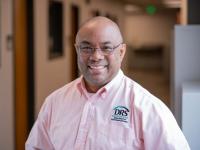
Presenter(s):
Jim Mendoza (he/him)
Hawaiians, Asians, and Pacific Islanders Promoting an Empowerment Network BRG (HAPPEN)

Session Description:
Stereotypes about Asian Americans are often held up as proof that racial labels can be flattering, but they subtly produce a number of problems in schools and workplaces.
This presentation will define the term "model minority", illustrate through video and personal experience the impact of micro and macro-aggressions caused, and offer solutions via open forum.
Objectives and Key Takeaways:
Attendees will learn about the "model minority" myth as well as be given the opportunity to share their personal experiences.
Audience:
Audience Knowledge and Experience:
Learn about the presenter(s):
Jim Mendoza, the son of Nicasio Damasco Mendoza (d) and Victoria Albrecht-Reyes, and is honored to serve as one of the inaugural co-chairs for the HAPPEN BRG.
Jim has been employed with the Department of Retirement Systems since 2004. He started as a Retirement Services Analyst specializing in issues dealing with death & disability. In 2006, he joined the Education & Outreach Team where he provides retirement plan, financial wellness, and investment education at a variety of settings – sometimes he even busts out into song.
Married for more than 35 years to his lovely wife, Laura, Jim is an advocate in the fight against breast cancer and served as fund raising chairman for the 2017 Race for the Cure. Jim’s interest in the fight against breast cancer is a byproduct of Laura being a 15 year survivor. In 2017, Jim was named Volunteer of the Year by Komen Puget Sound for his tireless advocacy efforts in the fight against breast cancer.
Jim’s community service includes having been a Little League Baseball umpire for 25 years, culminating in his selection to work the Junior League World Series in 2001. Jim is also a proud Freemason, having served as Grand Master (statewide president) in Washington in 2016-2017. During that time, he was able to use that platform to amplify his advocacy in the fight against breast cancer as well as raise funds to send 25 of our heroes on Honor Flights.
Ways to watch:
Live stream via Zoom Webinar on June 6, 2024
3 PM–4:30 PM Session
Immigration as a Barrier to Employment- Raising Every Voice
Presenter(s):
Teddy Dianah Kemirembe (she/her), Sarah MacLeod (she/her) & Seth Pilkey (he/him)
Department of Social and Health Services (DSHS)
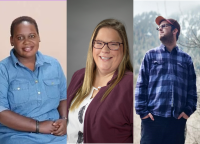
Presenter(s):
Teddy Dianah Kemirembe (she/her), Sarah MacLeod (she/her) & Seth Pilkey (he/him)
Department of Social and Health Services (DSHS)

Session Description:
We face many challenges in hiring and recruiting. We have exceptional candidates to choose from, however immigration is a barrier. Collectively we can and must take action to truly become an Employer of Choice including for those with immigration status. The recruitment process is prone to bias and fallacy, as well as racial and gender biases. This session will discuss what practices are needed to remove or reduce immigration as a barrier to employment. We will review the ways organizations can hear directly the voice of every team member and how to raise that voice. We will discuss the development of recruitment materials, the process of holistic review of immigration H.R. policy, and how to structure a raise every voice tour that increases Shared Power. With the goal of mitigating bias and comparing candidates as equitably as possible.
Objectives and Key Takeaways:
Attendees will leave with a better understanding of the complexity and cost of immigration as it relates to recruiting and the employee expierence.
- Workforce & Service Interuptions
- Types of Visas & Work Permit
- Intersectionality of Immigration (lived experiences)
- Tools & Strategies for barrier reduction
- Hearing & raising the voice of all staff
Audience:
Audience Knowledge and Experience:
Learn about the presenter(s):
Teddy Dianah Kemirembe (she/her)
Born and raised in Uganda, Teddy comes from a walk of humble beginning. Teddy’s story is long but in short here is the version:
Teddy has a master's in social work (MSW) from Columbia University School of Social Work with a passion in Diversity, Equity and Inclusion hence has attained Certificate of Diversity Profession (CDP)
Teddy has over twenty years in Social Work, working primarily with children and families and has tremendous experience in child welfare, working with children affected by developmental disabilities, and over 7 years working in emergency room as social worker assisting patients with mental health and homelessness.
Sarah MacLeod (she/her)
My name is Sarah MacLeod, I work for the Department of Social and Health Services - Developmental Disabilities Administration in the beautiful State of Washington. My passion is for supporting job seekers with opportunities with the DSHS is not only important for job seekers but also the clients that DDA serves every day. I look forward to continuing our mission of the DSHS by Transforming Lives to recruit top talent to state service through outreach and educational activities. My goal is to retain employees by providing them with support structure, education, and career progression assistance.
Seth Pilkey (he/him)
Over the last 15 years Seth has worked at the intersections of advocacy, relationship building, and social impact. Seth has worked with non-profit & government leaders and supported coached and mentored amazing individuals to live their fullest lives with an abundance of choice. He enjoys helping others navigate personal and organizational change, from line staff to leadership, initially as a Staff Development Partner at a large care and training facility. Seth currently serves our Developmental Disabilities Administration as a Management Analyst to executive leadership in the areas of hiring, retention and workforce development.
Ways to watch:
Live stream via Zoom Webinar on June 6, 2024
8:30 AM–10 AM Session
Disrupting Organizational Status Quo By Identifying Equity Gaps in Policy and Practice Across the Organization
Presenter(s):
Dr. William Lewis (he/him)
Willhouse Global
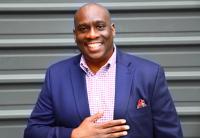
Presenter(s):
Dr. William Lewis (he/him)
Willhouse Global

Session Description:
In this session, Dr. Lewis, award-winning author (Sweet Potato or Pumpkin Pie: Conversations with my White Friends) and national people and culture thought leader, will invite participants to participate in an engaging conversation about why conducting an organizational assessment is important in disrupting policies and practices that maintain the status quo that keeps diverse employee populations from reaching their full potential within the organization. Participants will take a belonging organizational assessment and will discuss their results and receive feedback in real time. Lastly, participants will leave the session with tips and strategies for using data from the assessment that will help build a culture of belonging with the organization.
Objectives and Key Takeaways:
By the end of the presentation participants will:
- gain insights into the latest trends and research that will enhance your understanding of what it takes to create a team culture of belonging.
- gain access to a belonging organizational assessment that will help them identify equity gaps in their organization
- understand how belonging is a part of the change management process
- gain an understanding that disrupting organizational status quo happens by identifying equity gaps in policy and practice across the organization.
Audience:
Audience Knowledge and Experience:
Learn about the presenter(s):
Dr. William T. Lewis, Sr., an award-winning author and a nationally recognized people and culture thought leader, is an advisor and consultant to university presidents, and small to midsize business leaders. As a former Chief Diversity Officer, Lewis has led diversity and inclusion efforts at three highly acclaimed colleges and universities-- Indiana University, Bridgewater State University, and Virginia Tech University.
Lewis earned his Ph.D. in Higher Education Administration from Indiana University, Bloomington, IN. He holds a master’s degree in social work (MSW). He has dedicated his entire professional life to living the spirit of his social work background by "providing a voice for the voiceless and creating inclusive spaces for each person to reach their full potential.”
Lewis formerly served as the Special Consultant to the President for Belonging, Equity and Inclusion at Forsyth Technical Community College.
Ways to watch:
Live stream via Zoom Webinar on June 11, 2024
10:30 AM–12 PM Session
Enhancing Veteran Inclusivity in Washington State Workforce: Disrupting current policies for greater equity and belonging
Presenter(s):
VERG Members
Veterans Employee Resource Group BRG (VERG)
Presenter(s):
VERG Members
Veterans Employee Resource Group BRG (VERG)
Session Description:
This presentation aims to highlight the current state of veteran’s preference policies in Washington, and the underutilization of veterans’ special appointments. The presentation will also address the issue of veterans’ service time not accruing leave/sick time benefits, diminishing benefits for veterans and the very definition of ‘Veteran’ for the purposes of awarding benefits and legal recognition. The need for waivers for education in job postings, military service/training to be equivalent to college degree/courses for position qualifications, and how the lack of veteran’s preference policy affects veteran employment. The presentation will conclude with a discussion of the legal framework and challenges, and the Veterans In-State Shared Leave Policy (VISSLP).
Objectives and Key Takeaways:
- The need for a mandate on how to apply or include veterans’ preference in hiring and promotions.
- The need for OFM waivers for education to be equivalent to college degree/courses.
- The need to address the issue of veterans’ service time not accruing leave/sick time benefits, diminishing benefits for veterans.
Audience:
Audience Knowledge and Experience:
Ways to watch:
Live stream via Zoom Webinar on June 11, 2024
Recording available for replay July 1 through August 31
1 PM-2:30 PM Session
Disability Inclusion: simple steps you can take today to make your workspaces more inclusive and equitable
Presenter(s):
Linda Lohdefinck (she/her) & Sarah Norton (she/her)
Disability Inclusion Network BRG (DIN)
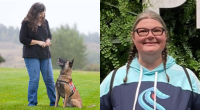
Presenter(s):
Linda Lohdefinck (she/her) & Sarah Norton (she/her)
Disability Inclusion Network BRG (DIN)

Session Description:
Understanding what access, accessibility, and usability are is just the first step in creating an inclusive, equitable, and just workplace where all employees have a sense of belonging. Join members of the WA State Disability Inclusion Network Business Resource Group as we not only provide a background on these key terms, but give you will the knowledge and power to leave this session with practical steps you can take to improve access, accessibility, and usability for people with disabilities in your workspaces. Whether you are a director, administrator, supervisor, or you are leading change from within, this is the place to be to learn how to make all employees belong in our workspaces.
Objectives and Key Takeaways:
- Understand the difference between access, accessibility, and usability;
- Become aware of how to look for and identify areas of limited accessibility or usability in the workplace;
- Create an action plan to make changes in your workplaces
Audience:
Audience Knowledge and Experience:
Learn about the presenter(s):
Linda Lohdefinck (she/her)
Linda is the current Chair for the Disability Inclusion Network Business Resource Group and works as a Health Services Consultant with the Washington State Department of Health as the PRAMS Coordinator in Data Collection & Reporting. She is the Director of Golden Ears Hearing Dog Training non-profit program. Linda is profoundly Deaf and lives with her hearing dogs, Lyra, Breeze (ret.) and Lady Jane (in-training). She has a Bachelor’s degree in Child Development and Family Relations/Counseling, a degree in Computer Science and has been a Licensed Practical Nurse since 1977. She has worked for the State of Washington for over 36 years. Linda is an advocate in promoting disability rights and accommodations. In her spare time, she competes with her dogs, gardens, sews beautiful quilts, enjoys reading and is active in her church.
Sarah Norton (she/her)
Sarah Norton (she/her/hers) is the past Chair of the WA State Disability Inclusion Network Business Resource Group, and is the Diversity, Equity, Inclusion and Belonging Specialist at the Department of Licensing. Hailing from Maine and moving to Washington in 2006, Sarah has a bachelor’s in psychology and a Master’s of Library and Information Science. Sarah is a passionate advocate for disability justice and for ending the oppression of all people. In her spare time she loves to read, go on adventures around the country, and spending time with her multitude of nieces and nephews. Sarah lives with her partner of 17 yrs and her two goldfish Lloyd and Bowie.
Ways to watch:
Live stream via Zoom Webinar on June 11, 2024
Recording available for replay July 1 through August 31
3 PM–4:30 PM Session
Embedding The 4-D Model of Neuro-Inclusive Communication
Presenter(s):
Chris Hooten, M.A. (they/them)
Chris Hooten Consulting
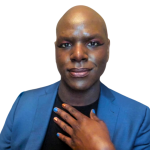
Presenter(s):
Chris Hooten, M.A. (they/them)
Chris Hooten Consulting

Session Description:
In this interactive session, participants will learn about the 4-D Model of Neuro-inclusive Communication, a framework developed to promote cooperation, collaboration, and compassionate communication in Neurodiverse teams, organizations, and communities. With one in five people being Neurodivergent in today's America, this model is crucial for ensuring that no one is left behind and that everyone can effectively communicate to drive a mission forward. The session will introduce a customizable framework that helps managers tackle dynamic and challenging communication problems while breaking down each of the four D's that make up the communication mode: Direct, Deliberate, Descriptive, and Diverse. The workshop will provide anecdotes, tools, and terminology to shift organizational and community orientation and understanding of Neurodivergent individuals away from a purely clinical and individualistic perspective. We will also discuss an asset-based approach to understanding Neurodivergent characteristics, reframing them as strengths rather than challenges that need to be isolated and controlled. The 4-D Model of Neuro-inclusive Communication was designed to promote Intersectional Neurodiversity, meaning that it takes into account the experiences of other less advantaged groups, including Gender-divergent individuals and People of Color.
Objectives and Key Takeaways:
Participants will leave the session with a deep understanding of the 4-D Model of Neuro-inclusive Communication, and how it can be applied to their work environment for DEIB and Anti-Racism work while ensuring accessibility and inclusion of people with disabilities.
They will learn how to approach communication challenges between Neurodivergent and Neurotypical team members, start conversations in the right way, and embrace Intersectional Neurodiversity.
Participants will also gain a new perspective on Neurodivergent individuals, understanding their characteristics and communication styles as strengths rather than challenges.
The workshop will provide attendees with the tools to promote cooperation, collaboration, and compassionate communication, leading to increased productivity, self-esteem, and innovative solutions to challenges.
Audience:
Audience Knowledge and Experience:
Learn about the presenter(s):
Chris Hooten, M.A. (they/them) is an accomplished speaker, writer, coach, and advocate. They are recognized nationwide for their work in helping teams create inclusive and equitable environments for Neurodivergent People of the Global Majority, women, and LGBTQ+ individuals. With over ten years of experience as an equity leader, Chris has developed training, tools, and curriculum that focus on cross-cultural communication, gender safety, and embracing Neurodiversity as a critical skill in the modern workforce. Chris collaborates with various organizations in the helping sectors, including the Space Needle, Chihuly Garden & Glass, Levy Restaurants, People of Color in Schools Seattle, and Bastyr University. Their services help these organizations create equitable and accessible cultures that support the success of all individuals. Their practice includes comprehensive cultural assessments and analysis, engaging and empathetic keynote speeches and workshops, accessibility-forward coaching, and tailored solutions to help organizations overcome challenges and bridge gaps.
Ways to watch:
Live stream via Zoom Webinar on June 11, 2024
Recording available for replay July 1 through August 31
8:30 AM–10 AM Session
Supporting Leadership and Utilizing BRGs to Recruit and Retain Latine Employees
Presenter(s):
Hermina Esqueda (she/her/ella), Tony Griego (he/him) & Monica Andrade Hupp (she/her)
Latino Leadership Network BRG (LLN)
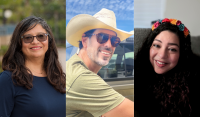
Presenter(s):
Hermina Esqueda (she/her/ella), Tony Griego (he/him) & Monica Andrade Hupp (she/her)
Latino Leadership Network BRG (LLN)

Session Description:
Statewide business resource groups (BRGs) bring together groups of employees and their allies who have a common interest or characteristic. Governor Inslee’s Executive Order 21-01 affirmed the value and contributions BRGs have to developing and maintain a high-performing public workforce that reflects and represents Washingtonians. Additionally, BRGs and their members bring knowledge and experience to help inform policy, practice, and business as agencies pursue pro-equity anti-racism work. BRG leaders and members are passionate about public service!
Washington’s Latine population continues to grow at a rate higher than other demographic groups. OFM projects that by 2034 the Latine (Hispanic ethnicity) population will grow by 25%. Our Latine population is also younger and will represent a major portion of the state’s workforce aged population. Despite the large potential workforce, Latines are underrepresented in Washington’s public service workforce. Additionally, Latine employees are entering a work environment that often doesn’t understand their lived experience, the challenges that Latine communities face, or the unique gifts and opportunities that Latine employees can provide. This leads to challenges with recruitment and retention of Latine employees. Fortunately, BRGs can help provide community and support agency efforts to recruit, retain, and support Latine employees.
While the flame of public service burns in our corazones (hearts), healthy collaboration and support from agencies is vital to avoid burnout among BRG leaders and members (BRG leaders are doing that work on top of their regular state job). BRGs are a relatively new asset for Washington state with more potential for growth and use. This presentation will provide useful information on how to engage with BRGs in a way that avoids exploitation and leverages the knowledge and experience of BRGs. It will provide real examples of agencies leveraging BRGs for PEAR results.
BRGs are an incubator for state leaders. Learn about how to support participation and development for BRG leaders. BRGs provide an opportunity for leadership and growth that’s true to a group’s culture and history. The lack of Latine leaders available as visible role models has led to imposter syndrome and code switching to hide our Latine identity. BRGs create spaces to model our culturally true and authentic leadership styles, ultimately improving equity in our workplace.
BRGs can play an important role in recruitment efforts from getting the word out about a job posting to participating on interview panels. They also can help provide information to help BRG members navigate the recruitment process and increase the potential candidate pool. Bilingual Spanish Customer Service roles are an import part of public service, but Latine employees can offer so much more for the workforce.
BRG events can provide an opportunity to engage with communities. Agency support and engagement can benefit both the BRG event and agency outreach. Washington’s Latine community is diverse and represents a variety of experiences from 1st generation to well established Latine families. Our understanding and experience can help inform agency outreach to be more relevant and culturally appropriate.
BRG members are a fantastic resource to help inform agency policy and practices. Learn about how BRG members have helped inform agency writing style guides and participated in agency workgroups. Spanish speakers are Washington’s largest population with limited English proficiency (LEP) and BRG members can help inform and shape agency language access policies and plans. Additionally, BRG members can bring that experience and knowledge to shape policy and practices beyond language access!
Working with BRGs can be a powerful opportunity for collaboration. By better informing agency leaders this presentation aims to unlock that power in a way that benefits both the agency and the BRGs. While the Latino Leadership Network serves to empower and support Latine state employees, these lessons apply to all of the Business Resource Groups and the communities that they serve.
Objectives and Key Takeaways:
- How to engage with BRGs in a mutually beneficial way.
- How BRGs and their members can help inform and improve agency services.
- How agencies can better recruit, retain, and support employees from marginalized communities.
- Why allies and allyship are critical to the success and sustainability of BRGs.
Audience:
Audience Knowledge and Experience:
Learn about the presenter(s):
Hermina Esqueda (she/her/ella)
Herminia Esqueda is a Pro-Equity, Anti-Racism Strategic Initiatives Administrator for the Department of Social and Health Services (DSHS). She is a Certified Diversity Executive and Certified Public Manager. She leads the Latino Leadership Network’s Diversity, Equity, and Inclusion committee. Herminia is passionate about removing barriers, providing access and creating spaces of belonging, for all communities to thrive.
Anthony (Tony) Griego (he/him)
Tony Griego is the Chief Equity and Access Officer at the Office of Administrative Hearings and a board member of the Latino Leadership Network. He has 15 years of experience in public service leading strategic planning, project initiatives, and DEI efforts. Tony is an active leader and advocate for Washington State’s business resource groups (BRGs). He’s been part of the Washington State Latino Leadership Network since 2018, contributing to build a more inclusive and welcoming community for Latine state employees. Outside of work, Tony loves to spend time in the outdoors hiking, backpacking, and riding horses. He’s currently learning how to be a “Rodeo Dad” supporting his son’s dreams to become a Black cowboy.
Monica Andrade Hupp (she/her)
Monica Andrade-Hupp is a Washington State Department of Health (DOH) Innovation Project Manager in the Center for Innovative Solutions & Program Excellence (CISPE) with a history of managing large hospital projects and events in healthcare and community settings. She is a graduate from California State University of Fullerton with a Bachelor’s in Sociology and is a current graduate student at the University of Washington. She is passionate about project management and the profound social impact projects can have on communities, policies, and systemic change. An advocate for diversity, equity, inclusion, and belonging, Monica hopes to inspire others to do the same, beginning within her own family and in her work as the Latino Leadership Network’s Co-Chair.
Ways to watch:
Live stream via Zoom Webinar on June 12, 2024
Recording available for replay July 1 through August 31
10:30 AM–12 PM Session
Building an Organizational Road Map for Equity & Belonging
Presenter(s):
LueRachelle Brim-Atkins (she/her)
Brim-Donahoe & Associates
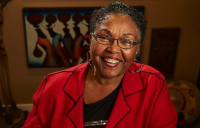
Presenter(s):
LueRachelle Brim-Atkins (she/her)
Brim-Donahoe & Associates

Session Description:
At long last, organizations are seeking to dismantle the racism and inequities that allow discrimination, isolation and other atrocities to continue at work. Ending racism does not take time. It takes a decision, intention and a plan to do so. This session will provide a Road Map by which leaders and their organizations can begin &/or continue their work to dismantle racist and inequitable systems. This session will help leaders:
- muster the courage and determination to do their part to abolish racist systems
- identify the barriers to equity and belonging in their organizations
- develop a plan, strategies & tools to disrupt inequitable policies and practices
Objectives and Key Takeaways:
This interactive session will introduce leaders to a DEIB Road Map that, with guidance, they can begin to implement in their organizations. We will present a model that we use with clients and will answer these & other questions:
- “I want to do this work but where/how/when do we begin?”
- “How do we engage staff and hold them accountable for helping to abolish racist policies, practices & procedures?”
- “What do we do beyond staff training?”
- “What do we do when there is resistance from our teams, our community (or from ourselves)?”
- “How can we tell if/when we are making progress & how do we continue to improve?”
Audience:
Audience Knowledge and Experience:
Learn about the presenter(s):
LueRachelle Brim-Atkins is an innovative consultant, executive coach, facilitator, educator, and trainer. She grew up and attended college in the South and completed graduate schools in the East and West. She has traveled to 36 countries, several multiple times. She is a sought-after speaker at local, national and international conferences including at a recent international conference in Cape Town, South Africa in 2023. LueRachelle has taught in public K-12 and at universities, served as the lead consultant and facilitator for public, private & non-profit organizations including Fortune 500 corporations, Education Service Districts, school systems, governmental agencies, law firms, health care organizations, colleges and universities, professional associations and boards.
Ways to watch:
Live stream via Zoom Webinar on June 12, 2024
Recording available for replay July 1 through August 31
1 PM-2:30 PM Session
Living in Two Worlds-Unpacking Institutional and Policy Inequities Through Story
Presenter(s):
Elizabeth Coleman (she/her), Tammy Cooper-Woodrich (she/her), Angela Letoi (she/her), and Melody Woodrich (she/her)
Healing Through Hope
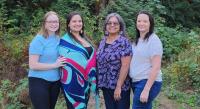
Presenter(s):
Elizabeth Coleman (she/her), Tammy Cooper-Woodrich (she/her), Angela Letoi (she/her), and Melody Woodrich (she/her)
Healing Through Hope

Session Description:
Using the gift of indigenous and personal stories, three generations of mixed heritage presenters will share their lived experiences navigating society and services.
Together, they will take you through a journey of their lived experiences with walking in two worlds, code switching, and resiliency using traditional and personal stories.
Objectives and Key Takeaways:
Participants will gain a better understanding of how institutional norms, standard practices, and organizational policies can create unintended barriers to accessing services and some considerations to begin decolonizing these practices.
Audience:
Audience Knowledge and Experience:
Learn about the presenter(s):
Elizabeth Coleman, is a 21-year-old student at Western Washington University. She is deeply passionate about inclusivity and currently working on her major in Inclusive Teaching with a minor in Disability and Advocacy, alongside pursuing an Elementary Education teaching endorsement.
Outside of her studies, she works as a dementia caregiver, bringing empathy and patience to her roles.
In her free time, she enjoys beading and crocheting. Her commitment to education and advocacy extends beyond the classroom to her work, where I strive to create supportive environments for those she cares for. With a heart for service and a dedication to learning, she is navigating a path that blends education and caregiving, aiming to make a positive impact on the lives of others.
Tammy Cooper-Woodrich (Skwetsla’tse’emo’t), Nooksack Tribal elder, has been a Tribal Storyteller since 1985. She has told stories to many people throughout Washington State in many different institutions and agencies. She was invited to Port Stephens, Australia and was able to share her stories with several city and aboriginal Tribal Councils along with several schools, from daycare to high schools through the ‘We Share a Story Program.’
She is currently a North Intertribal Vocational Rehabilitation Program (NIVRP) Counselor for the Stillaguamish Tribe of Indians, serving Federally Recognized American Indians with permanent disabilities. Her household has been responsible for 11 children over the past 30 years. She is a mother of 4 grown children, has 13 grandchildren and 2 great grandchildren.
Tammy will be sharing her knowledge of cultural sensitivity training and Tribal Stories speaking to her tribal heritage. She will also share how her position as a vocational rehabilitation counselor with NIVRP has allowed for her clients to come back to the work force while getting support related in a traditional and cultural manner.
Angela Letoi (Skwetslatse’elho’t/Si’li’xw’tunawt) is a member of the Nooksack Indian Tribe and has Lummi ancestry. She has been with her husband Tulaga for 4 years and has 6 children and two grandsons. She decided to follow her mother’s footsteps and began telling stories in 2017 while attending college at Northwest Indian College. She works as an indigenous caregiver specializing in dementia and end-of-life care as well as being Executive Director of the newly formed non-profit, Healing Through Hope, and enjoys spending time with her elders and her Grandsons, Braxton Jay and Maverick Ry.
Melody Woodrich, Community Programs Director, Northwest Regional Council (NWRC) and Wisdom Warriors co-creator. She has a passion for person-centered, community supported, health & wellness activities along with supporting people to receive the care and support needed to live in a meaningful way. She has a Bachelor of Arts in Leadership and Organizational Studies from Antioch University. Melody was raised and continues to reside within the Nooksack tribal community with her children, Elizabeth and Brahnan. In her free time, she can be found gathering plants and making traditional medicines, supporting youth sports and activities, cooking for the community, and engaging in cultural events.
Ways to watch:
Only available as a live stream via Zoom Webinar on June 6, 2024
3 PM–4:30 PM Session
Normalizing Shared Power as a tool to Disrupt Policies, Practices, and Processes (The 3 P's)
Presenter(s):
Rauniesha Larkins (she/her/diva), Sabrina Njoroge (she/her), Amber Ortiz-Díaz (she/her/ella) & Jean Paul (he/him)
Office of Equity (EQUITY)

Presenter(s):
Rauniesha Larkins (she/her/diva), Sabrina Njoroge (she/her), Amber Ortiz-Díaz (she/her/ella) & Jean Paul (he/him)
Office of Equity (EQUITY)

Session Description:
The Shared Power Consultants from the Office of Equity will be conducting a workshop that will introduce Relational Partnership (RP) and its significance to government employees and community. For the Pro-Equity Anti-Racist (P.E.A.R.) framework to thrive, Relational Partnership must be at its foundation. The consultants will go over the definition & importance of Relational Partnership, our partnership with the Centre for Public Impact, and review the RP Toolkit resources that will further PEAR outcomes throughout the state of Washington.
Objectives and Key Takeaways:
- Disrupting the current “status quo” of processes and policies within state government
- Shared Power principles
- Relational Partnership in Practice
- Building a Community of Practice (CoP)
Audience:
Audience Knowledge and Experience:
Learn about the presenter(s):
Rauniesha Larkins (she/her/diva)
Rauneisha (pronounced Ron-Nee-sha) is a charismatic leader who tends to win people over with her warm and infectious smile. She is a native of Cincinnati, Ohio but relocated to Washington when she was stationed here as a service member. Rauneisha is now a proud veteran who enjoys traveling, being a newlywed, and being a dog mom!
Sabrina Njoroge (she/her)
Sabrina (pronounced Suh-Bree-Nuh Ja-Row-Geh) is a passionate social justice advocate and steadfast champion of equity. Sabrina embraces the role of being a single mom, nurturing her energetic, neurodivergent 3-year-old while inspiring them with her dedication to making the world a better place. Her love for connecting with people is evident in her warm interactions, where she finds joy in building bridges and fostering meaningful relationships. When she’s not busy advocating or parenting, you can find Sabrina immersed in the world of music, enjoying soulful tunes, and even sharing her own melodious voice through singing.
Amber Ortiz-Díaz (she/her/ella)
I'm thrilled to be part of the Office of Equity as a Shared Power Consultant. I'm passionate about fostering genuine connections within teams. I believe in the power of collaboration and open communication to achieve shared goals. In my previous roles, I've seen firsthand how understanding and appreciating the unique qualities of each team member contribute to a positive working environment. Every opportunity I carry my ancestors and community with me. Personally, I am a first-generation professional, proud of my Mexican culture, a wife, and mother of two amazing boys. I love to support small businesses, traveling, and spending time with my family.
Jean Paul (he/him)
Jean Paul is a committed diversity, equity, inclusion, and belonging (DEIB) professional whose background includes introducing marginalized youth to STEM careers, helping at-risk fathers with child custody, and achieving economic freedom and now being a part of the Washington State Office of Equity. Born on the beautiful island of Haiti, Jean relocated to the U.S. as a teenager. He is now a proud husband, father of two, community leader, and doggy dad. In his spare time, you can find Jean playing with his children, tending to his garden, bird watching, and taking long walks with his dog Onyx
Ways to watch:
Live stream via Zoom Webinar on June 12, 2024
Recording available for replay July 1 through August 31
The 2024 DEI Empowerment Conference will be held virtually over Zoom Wednesday June 5, Thursday June 6, Tuesday June 11 and Wednesday June 12. See the conference FAQs.
The conference dates have been thoughtfully chosen not to overlap with important Business Resource Group (BRG) annual events. We encourage team members to attend virtual and in-person BRG events, including those being planned by WIN, BUILD, and RAIN during the month of June! We are excited to partner with our BRG community!
Ways to Watch
-
Live Virtual Sessions
We encourage you to block time on your calendar to attend the live sessions. While we strive to provide accessible solutions like recorded sessions for later playback, some sessions may only be available live (e.g., for presenter safety or due to other concerns). -
Conference with Colleagues
We will also have "Conference with Colleagues" gatherings that will welcome state employees to watch virtual sessions together, in person, in Olympia and Spokane. More details to come!
Brand Toolkit
Feel free to use the DEI Empowerment Conference logo and other graphics when sharing information about the event within your own agency:
- Download our brand toolkit, including logo files [ZIP file, 11MB]
- Before using, please review the logo guidelines [PDF]
Sponsors and Core Team
Thank you to our sponsors:

Executive branch cabinet members and other state HR contributing agencies
Statewide DEI Council
Thank you to our Core Team member agencies:
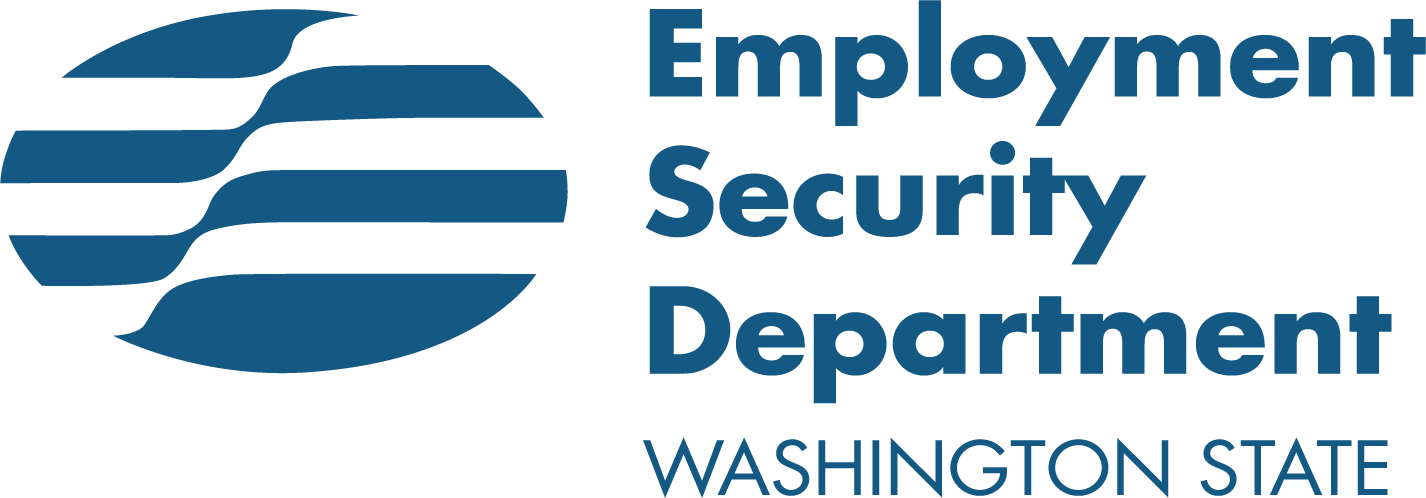
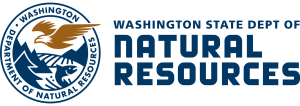

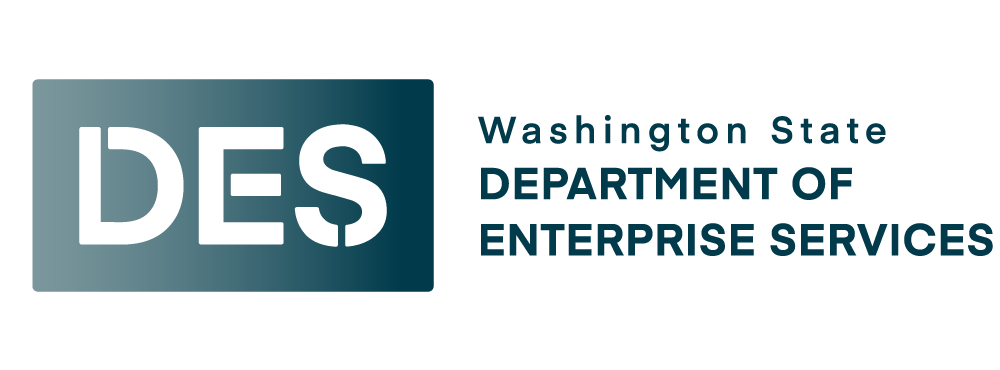


Learn more
Past DEI conferences
See materials from previous DEI summits
State DEI training


